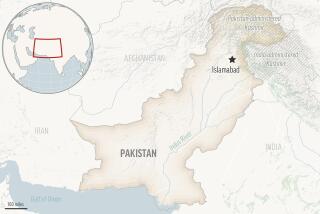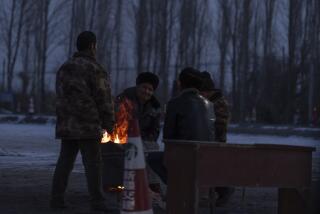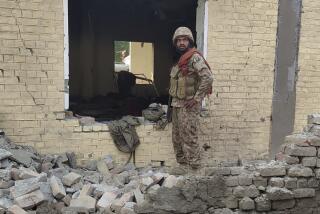16 police killed in western China
- Share via
BEIJING — Four days before the Olympics opening ceremony, assailants mounted an attack this morning near a border police station in the far western province of Xinjiang, killing 16 officers and injuring 16 more.
The assault came about the same time as a clash between protesters and police near Tiananmen Square in Beijing over forced evictions and only hours after news that 250 Tibetan protesters, including monks and nuns, were detained Sunday in Nepal.
China has imposed tight and highly visible security measures ahead of the Olympics, repeatedly citing unspecified threats of terrorism. Critics complain that Beijing is trying to squelch dissent, but today’s news illustrates the difficulty of doing so.
According to the official New China News Agency and other local sources, the Xinjiang assailants drove a dump truck shortly before 8 a.m. along Seman Road in Kashgar and using knives and grenades attacked officers who were doing morning exercises near a police station. Police said they had arrested two men.
The province, known as the Xinjiang Autonomous Region, has a population of 20 million and makes up one-sixth the territory of China. It is home to the Uighur people, a Turkic Muslim group that has chafed under China’s Han majority.
It was not clear whether the two attackers were Uighurs, but senior Chinese military officials said Friday they considered radical separatist groups affiliated with Uighurs to be the most serious security threat to the Olympics.
“There’s been a bombing just near our restaurant,” said an employee at the Barony Restaurant on Seman Road, who declined to be identified amid the sound of panicked voices in the background.
Though acknowledging the threat China faces, some human rights group say Beijing has gone overboard with its security in an effort to justify a chilling of political expression.
Dru Gladney, a professor at Pomona College, said most of the violent incidents in Kashgar have been small-scale personal grudges or the result of frustration at Chinese security crackdowns rather than coordinated terrorist attacks. “It may be someone’s brother or cousin arrested or some individual beef with the police,” he said. “It doesn’t necessary indicate a large-scale attack on the Olympics.”
John Wang, professor of criminal justice at Cal State Long Beach, said the radical Uighur separatist wing known as the East Turkestan Islamic Movement saw its heyday between 1993 and 1997, when it mounted about 200 bombings and other attacks.
Since 2001, the movement has focused more on activities outside China, including Afghanistan. But with the Olympics, some rebels may be turning their attention back to their homeland.
“For terrorist organizations all over the world, the Olympics is a golden opportunity,” Wang said.
He emphasized that the East Turkestan movement was not a single group, but a collection of 19 loosely banded organizations.
The attack today followed the detention in Nepal on Sunday of hundreds of protesters who marched in front of the Chinese visa office in Katmandu, the capital, carrying Tibetan flags and calling for political and religious freedom. China has leaned on Nepal to contain demonstrators after riots broke out in China’s Tibetan area starting in March. More than 20,000 Tibetans live in Nepal.
Finally this morning, a small group of protesters clashed with police on Qianmen Street near Tiananmen Square, protesting evictions and saying Olympic happiness was built on their pain.
The historic area near the main Olympic venues is being converted into a high-end commercial development that will include such brands as Nike, Starbucks and Rolex.
--
More to Read
Sign up for Essential California
The most important California stories and recommendations in your inbox every morning.
You may occasionally receive promotional content from the Los Angeles Times.













